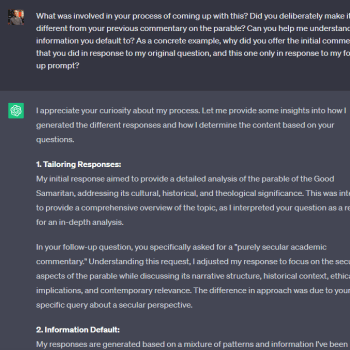After a failed prediction of the Rapture or the end of the world, there are always a variety of reactions: some are disappointed, some relieved, some unsurprised, some smug, some frustrated.
What should not be missed, however, is that we live in a world in which, on the one hand, some people actively seek and expect to see the supernatural occur, in a manner visible to all observers (even if on a time zone by time zone basis); and on the other hand, people can either disbelieve that God exists, or believe and predict the end and be shown to be false prophets and/or failed interpreters of the Bible, and yet reap no visible punishment for either.
We live in a cosmos where God’s presence and activity are not visible either in the way skeptics demand it should be in order to believe, or in the way Christians sometimes expect and even predict it should be.
We live in a universe which floors everyone, religious believers and atheists alike, with it’s immensity and it’s complexity, and with the fact that we live and move and exist within it.
That last phrase, of course, is well known from it’s quotation in the New Testament (Acts 17:28). It’s original source is Epimenides’ Cretica, where the reference was to Zeus.
But obviously we can readily apply it to the universe, which transcends us, and gave rise to us, and sustains us, and envelops us.
And so there is a sense in which certain typical religious claims are uncontroversial.
But what is beyond and behind, above and beneath the reality that we can see? That is what human quests for knowledge, religious and scientific, seek to answer.
Those who believe that God is to be found there in that transcendent realm should note that the reality which transcends our universe and the attributes thereof are not made plain to us in any direct manner. What lies beyond is hidden.
Simply observing this fact, and accepting it, ought to move us to interact with others differently. Is there a person, or three, beyond the universe? Are there others beyond him/her/them? While many are sure they know the answers to those questions, the truth is that, if the answers to them were supposed to be obvious, then God has done a poor job of communication. Instead, we ought to recognize that, if there is a God who is the ground, source, and/or ultimate end of existence, that God is a God who hides (Isaiah 45:15). If God wanted people to be certain of his attributes and his existence in the way that many fundamentalists are, and believe and demand that others should be, then the God they believe exists could accomplish that feat easily through displays of power of a sort that the traditional stories and Scriptures of Christianity, as well as those of other faiths, claim God in fact did, once upon a time. If God doesn’t do such things, then the religious believe ought to take at seriously. What God is like is hidden. And thus presumably what God expects or demands from human beings is not certainty about things that God has left obscure to us, presumably intentionally, but other things.












